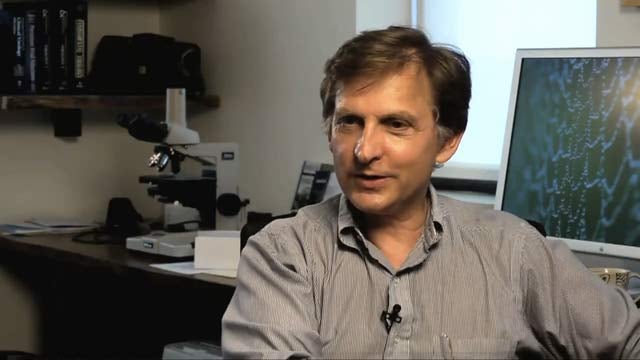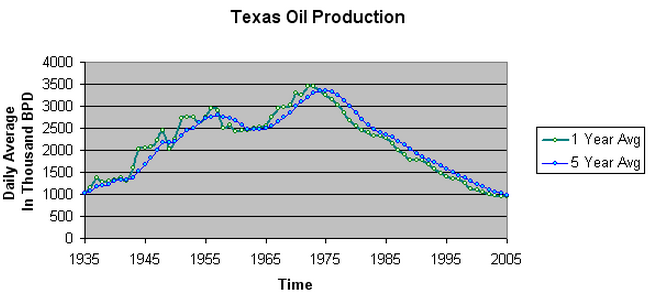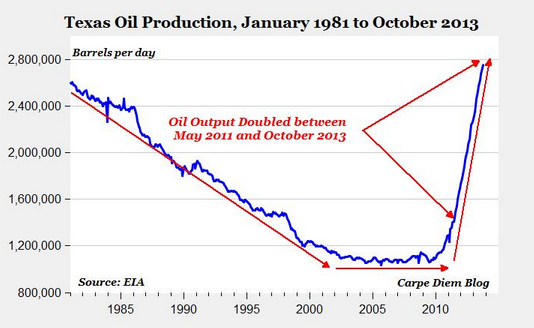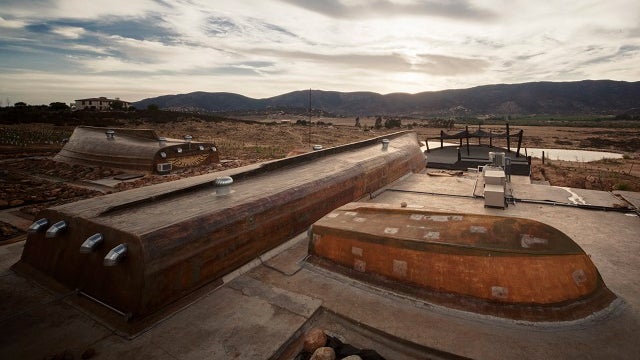 Taking action to reduce inequality would probably increase, not reduce, economic growth.
Taking action to reduce inequality would probably increase, not reduce, economic growth.
Shared posts
No Texas oil multiplier (dedicated to Adam Gurri and Noah Smith)
Tyler Cowen recently directed me to a post by Phillip Longman in the Washington Monthly, which attempts to debunk the “Texas miracle.” His main argument is that the boom in Texas is a product of the recent oil boom, not good economic policies. Even that is questionable, as lots of other places have large amounts of oil and gas but simply choose not to frack (Europe, New York, California, Mexico, etc.) But let’s accept the “Texas is lucky” argument for the moment; do the facts support this multiplier claim?
Unless you’ve been to Texas lately, you might have missed just how gigantic its latest oil and gas boom has become. Thanks to fracking and other new drilling techniques, plus historically high world oil prices, Texas oil production increased by 126 percent just between 2010 and 2013. . . .
To be sure, only about 8 percent of the new jobs in Texas are directly involved in oil and gas extraction, but the multiplier effects of the energy boom create a compounding supply of jobs for accountants, lawyers, doctors, home builders, gardeners, nannies, you name it. Saying that Texas doesn’t depend very much on oil and gas just because most Texans are not formally employed in drilling wells is like saying that the New York area doesn’t depend very much on Wall Street because only a handful of New Yorkers work on the floor of the stock exchange.
You’d think the editors of Washington Monthly would have at least checked the data, to see if his multiplier claim was accurate. It only takes 5 minutes. And as we’ll, see the data decisively rejects this argument. But first a bit of history about Texas oil production. Notice how it plunged in the decades after 1975:
Now look at the population growth by decade:
1970-80: 27.05%
1980-90: 19.89%
1990-2000: 22.74%
2000-10: 20.63%
Texas’s population grew at roughly twice the national rate for decade after decade, even as oil output was declining sharply. Now look at the recent trends in oil output:
So the Texas oil boom was quite recent, beginning about 2010. Now let’s look at the population growth figures before and after the recent boom:
2005-06: 2.55%
2006-07: 2.01%
2007-08: 2.02%
2008-09: 2.02%
2009-10: 1.85%
2010-11: 1.62%
2011-12: 1.52%
2012-13: 1.50%
Where is all the population growth from fracking? Where is the multiplier, the spinoff jobs for other sectors? I suppose you could argue that while Texas hasn’t seen any more population growth, the unemployment rate has fallen more sharply than in other states. After all, only 6% of the Texas workforce is unemployed, as compared to 6.7% for the country as a whole. The problem here is that unemployment in Texas peaked at 8.3% in February 2010, versus a peak of 10% for the US. So the fall in the unemployment rate in Texas has actually been smaller than for the country as a whole (even slightly smaller in percentage terms). The fracking boom has not had a noticeable effect on either population growth or unemployment.
Sometimes I think that Keynesians are so convinced that there is a “multiplier effect” that they don’t even both to check the data. At least Paul Krugman has the good sense to make the argument in terms of GDP, not population:
But I wanted to follow up on one particular point: the role of oil and gas in recent years. Longman concedes that these industries directly account for a fairly small share of the economy even in Texas, but argues that their rapid growth, combined with multiplier effects, makes them a much bigger story when it comes to Texas growth. Indeed. Let me put some numbers to this, using the BEA data on real GDP by state.
What you learn from these data right away is that Texas is indeed king of the extractive expansion. Nationwide, mining output, measured in 2005 dollars, expanded $29 billion between 2007 and 2012; Texas accounted for $22.7 billion of that expansion. Nationally, the expansion of mining was 0.2 percent of 2007 GDP; in Texas, it was 10 times that, 2 percent.
Oil extraction is very capital intensive, so I don’t doubt the Texas GDP numbers would look better than their population or unemployment numbers. But that’s not the big story, and even Krugman admits that there’s much more to the Texas growth story than oil. The big story is that people have been moving to Texas in large numbers for many decades, even decades when oil production was falling fast.
Sorry liberals, but there really is a Texas miracle, and it has nothing to do with “multipliers.” It is explained by the fact that working class people like to move to states with low living costs (due to flexible zoning), and businesses and high skilled professionals like to move to states with low income taxes. The working class cares more about the low living costs than the fact that Texas offers less expensive welfare programs than California. They come to Texas to work, not to collect welfare. The businesses bring them the capital they need to be productive workers.
My only quibble with Krugman’s post is that he leaves out the lack of a state income tax, which helps explain why Texas grows far faster than other south central states with hot weather and cheap houses. The big story is that people have been moving to Texas in large numbers for many decades, even decades when oil production was falling fast.
PS. I was going to take Sunday off, but was inspired to write this post by Saturos, who is of course right about the decline in quality of my writing. That’s what happens to grouchy old reactionaries. But when Keynesians keep throwing softballs over the center of the plate, it’s hard to step away. I know Adam Gurri doesn’t read my blog, but perhaps someone can tell him that Knausgaard has inspired me to adopt a maximilist approach.
Update: Some commenters suggested that the Texas miracle is due to cheap real estate. This post demolishes that argument.
Is The Supreme Court About To Rule That Software Is Ineligible For Patent Protection?
The College Blackout and the Fleecing of U.S. Taxpayers
Read More ...
Supreme Court To Rule on Cell Phone Privacy
The Fourth Amendment protects our “persons, houses, papers, and effects, against unreasonable searches and seizures.” That includes the cell phones in our pockets, and the many private messages, photos, and videos those devices contain. But what happens if we get arrested for a minor (or major) infraction? Do the police now have the lawful right to search our cell phones for incriminating material without a warrant? Or does the Constitution still act as a shield?
The U.S. Supreme Court will address those questions next month when it considers a pair of cases testing the reach of the Fourth Amendment in the age of the smartphone. The Court’s response has the potential to impact the lives of countless of Americans in their dealings with the police.
Both cases began with criminal arrests. In the first case, Riley v. California, San Diego police conducted a routine traffic stop and discovered two guns hidden under the hood of the car. After bringing the suspect back to the station, the officers proceeded to conduct a warrantless search of his smartphone, where they discovered videos, photos, and text messages they believed tied him to a gang-related shooting. That evidence later helped the prosecution gain a conviction.
In the second case, United States v. Wurie, Boston police arrested a suspected drug dealer. Back at the station, they noticed his flip-screen cell phone was receiving multiple calls from a number identified on the outer screen as “my house.” According to the officers, they suspected this might in fact be the dealer’s “stash house,” so they traced the number back to an address, and later raided the residence, turning up illegal drugs. In both cases, the officers had ample time to obtain a search warrant before digging around in the respective cell phones.
According to a long line of Supreme Court precedent, the police do not need a warrant to search the individuals they arrest, and that includes both the persons and possessions of the arrestees, including any bags, containers, or other items they were carrying. Furthermore, the police may conduct a warrantless search of the immediate vicinity around the arrest site. This exception is designed to help law enforcement prevent the destruction of evidence and to discover any evidence or weapons that might have been concealed.
The rise of the cell phone complicates this picture. Unlike diaries, notebooks, or briefcases, all of which the police are allowed to search incident to arrest, cell phones contain previously unimaginable amounts of personal information, including not only words and images but also GPS location data. In other words, should getting arrested for a minor offense like jaywalking be sufficient to allow the police virtually unlimited access to your private affairs in search of additional wrongdoing?
The lower courts are divided. In 2013, the California Supreme Court ruled against David Riley, letting the warrantless search of his cell phone stand. The U.S. Court of Appeals for the 1st Circuit, by contrast, ruled against the police that same year in the Boston case, adopting a “bright-line rule” that “the search-incident-to-arrest exception does not authorize the warrantless search of data on a cell phone seized from an arrestee’s person” under any circumstances.
The Obama administration has sided with the police. “Although cell phones can contain a great deal of personal information,” the administration argues in its Wurie brief, “so can many other items that officers have long had authority to search, and the search of a cell phone is no more intrusive than other actions that the police may take once a person has been lawfully arrested.”
The lawyers representing David Riley take the opposite view, comparing a warrantless cell phone search incident to arrest to the “odious colonial-era practice of executing general warrants—warrants that enabled officers to rummage though people’s homes and offices for whatever incriminating items they might find.”
An amicus brief filed by a group of Fourth Amendment scholars urges the justices to strike a balance. “Rather than allowing warrantless searches of cell phones incident to arrest,” the brief argues, “the Court should encourage law enforcement officers to place cell phones in [aluminum-lined] Faraday envelopes or aluminum foil to prevent the remote wiping of data from the phone while officers seek a warrant.” This approach has the virtue of allaying any law enforcement concerns about the destruction of evidence while still respecting the citizenry’s constitutional rights.
Oral arguments in Riley v. California and U.S. v. Wurie are scheduled for April 29, 2014.
Resurrecting Republican Populism
Future food Soylent delayed again—now arriving in mid-to-late April
JackI wish I could get excited about this product. But meh.

Bad news for future food backers awaiting their shipments of Soylent: the meal supplement/substitute's arrival has been pushed back again, this time to mid-April. In a blog post this afternoon, the company blamed the latest delay on the manufacturer supplying Soylent's rice protein component. The manufacturer has so far been unable to deliver the requested quantity to RFI, the company Soylent has contracted to package its product for distribution (called the "co-packer").
According to the Soylent blog post, as a stopgap contingency, it has ordered "several pallets" of the protein via expedited air freight while the remainder of the rice protein order (all 28 tons of it, according to Soylent VP Julio Miles) is produced. The stopgap shipment will let the co-packer at least get started on sending Soylent to the crowdfunding backers who originally gave money to get the project going.
Soylent founder Rob Rhinehart has long planned for the initial shipment of Soylent to occur only after there was a sufficient quantity of the stuff for customers to re-order. This has meant that even after the formula was locked down (which didn't happen until December), there was always going to be a pause to spin the manufacturing side up. However, unanticipated difficulties with what is essentially a large-scale manufacturing operation have kicked the "release" date back a number of times since the end of 2013.
Read 2 remaining paragraphs | Comments
China Merges Wal-Mart With Goldman Sachs in Alibaba
JackIt's interesting to see how big in some ways Alibaba has become.
Visit an Incredible Winery Built Out of Abandoned Boats
JackCool. And I am a sucker for puns in the comments.
Behold the New 3,296-piece Lego Star Wars Sandcrawler!
This is definitely the Lego Star Wars Sandcrawler I was looking for. It's not as massive as the fan built vehicle that every Lego and Star Wars nerd in the world wanted, but with all its moving mechanism and seven minifigs, it's a must have. Its character and construction seems well resolved. Check out the pictures and the video, because it's really cool.
This Custom Michonne Doll Would Take Barbie’s Head Off

Flickr’s Peewee Parker likes to make custom dolls and, as you can see, does some pretty kickass work. This custom Michonne looks like she’d take Barbie out in about two seconds.
She’d probably keep Ken as one of her “pets” while she was at it.
(via The Mary Sue)
Contractor Cleans Out Foreclosed House, Finds Deceased Owner
 If you suddenly disappeared, who would notice that you were gone? The neighbors of one woman in Pontiac, Michigan hadn’t seen her in years. She traveled a lot for work–maybe she was working offsite for an extended period, or she had moved away and simply not sold her house yet. No, she was home the whole time. In her Jeep. Dead.
If you suddenly disappeared, who would notice that you were gone? The neighbors of one woman in Pontiac, Michigan hadn’t seen her in years. She traveled a lot for work–maybe she was working offsite for an extended period, or she had moved away and simply not sold her house yet. No, she was home the whole time. In her Jeep. Dead.
“Haven’t I read this story already?” you might be saying. You’re probably thinking of when more or less the same thing happened a few years ago, in Florida. In this case in Michigan, all we know so far is that the deceased was from Germany, and had moved to Detroit to work in the auto industry. (Based on her owning a Jeep, we’re going to guess that she might have worked for Chrysler.)
Neighbors couldn’t agree on how long it had been since they last saw her. One said six years, and another guessed three. Authorities told TV station WXYZ that the woman was mummified, so she had been dead for at least a few years.
“You’d think because of her job, and we heard she had a son, so you’d think someone would’ve come looking for her,” one neighbor told a reporter.
Woman’s body found in garage of her foreclosed home in Pontiac years after her death [WXYZ]
California Assemblyman is Trying to Put SeaWorld Out of Business

Something like this was bound to pop up in the wake of the acclaimed documentary Blackfish : a California state assemblyman named Richard Bloom has proposed a bill that would ban orcas from being used for performative reasons.
The indie game console may already be dead

Last year, I predicted that the rising tide of Android gaming would raise all boats — that indie game consoles like the Ouya, the Shield, and the Gamestick could mount a challenge against Xbox and PlayStation because of all the attention they were getting as a whole. Sadly, it looks like I was wrong. This week, the leader of the indie console charge is standing down.
Ouya was in the right place at the right time in the summer of 2012. One of the early Kickstarter darlings, the $99 hackable Android game console raised $8.5 million on the strength of its convictions and the résumés of its founders. Ouya CEO Julie Uhrman — a former VP of digital distribution for IGN and GameFly — offered a compelling vision of a game system that...
Long-lost fantasy film that accompanied 'Star Wars' will see wider release

A little-known part of Star Wars history is Black Angel, a 25-minute film that tells the story of a medieval knight returning home from the Crusades and discovering a strange land instead. It was the directorial debut of Roger Christian, who designed the sets on the first Star Wars film, and was given a small budget by George Lucas to create the short film, which was later shown to audiences before Star Wars Episode V: The Empire Strikes Back in Europe and Australia.
Microsoft may bring targeted political ads to Xbox Live

Your Xbox Live dashboard may soon feature targeted political ads. According to the Washington Post, Microsoft has been courting politicians to start using its service to advertise their campaigns, going so far as to hand out promotional information at this week's Conservative Political Action Conference in San Diego.
In 2012 Microsoft rolled out an election hub for the Xbox 360, which featured live coverage and news, but this would be something different — ads that use both public information and data culled from your Xbox Live account to deliver targeted ads for specific demographics. The report makes no mention of the Kinect; Microsoft has previously said that it has policies in place that "prohibit the collection, storage or use of...
Scientists unlock mystery of out-of-body experiences (aka astral trips)

Some people claim that they have experienced out-of-body experiences—aka "astral trips"—floating outside of their bodies and watching themselves from the outside. A team of scientists found someone who says she can do this at will and put her into a brain scanner. What they discovered was surprisingly strange.
Meet the World’s Top Virus Hunter

Ian Lipkin, world-renowned virus hunter, is often jetting off to far-flung countries—countries in the middle of strange epidemics, that is. From SARS in China to MERS in Saudi Arabia, his lab has discovered or characterized over 500 viruses previously mysterious to humans. But what's it like working on the frontlines of an epidemic? How do you identify a virus you can't even see? Gizmodo got in touch with Lipkin to ask some questions about the life of a virus hunter.
Your Favorite Fan Boy Needs This Desk Designed for Apple Products

Do you ever sit there and wish your desk were better suited for your many gadgets? Seriously, that standard flat piece of wood you've been sitting at for years was not designed for computers, much less tablets or phones. But the SlatePro is.
This Tree-like Building Sprouts Balconies Instead of Branches
The gates of hell open in this time-lapse video

I just came across this cool old time-lapse video made by scientists from the US Geological Survey: The collapse of the crater floor of the Puʻu ʻŌʻō, one of the cones of the Kīlauea volcano in Hawaii.
This super nifty one armed robot is better at ping pong than you
Jawbone's 'Up Coffee' app tracks your caffeine intake, estimates when you'll finally be able to sleep
 Ah, caffeine. So addictive. So energizing. So unhealthy. It's no secret that coffee lends itself to spurts of early-morning productivity, only to be followed by mid-afternoon slumps. And yet, we're somehow always surprised when that 4PM frappuccino...
Ah, caffeine. So addictive. So energizing. So unhealthy. It's no secret that coffee lends itself to spurts of early-morning productivity, only to be followed by mid-afternoon slumps. And yet, we're somehow always surprised when that 4PM frappuccino...
Judge rules that flying commercial drones is legal, for now (update: FAA appeals decision)
 The Federal Aviation Administration may want to go through some rigorous testing before it allows commercial drone flights on a broader basis, but the National Transportation Safety Board isn't willing to wait that long. One of the Board's judges has...
The Federal Aviation Administration may want to go through some rigorous testing before it allows commercial drone flights on a broader basis, but the National Transportation Safety Board isn't willing to wait that long. One of the Board's judges has...
Watch a man get stunned by the Chaotic Unmanned Personal Intercept Drone (stun copter!)
 You're gonna want to steer clear of this CUPID. The Chaotic Unmanned Personal Intercept Drone, or "stun copter," can deliver 80,000 volts of pure projectile terror directly into the skin of an ill-intentioned hoodlum. This is serious business for...
You're gonna want to steer clear of this CUPID. The Chaotic Unmanned Personal Intercept Drone, or "stun copter," can deliver 80,000 volts of pure projectile terror directly into the skin of an ill-intentioned hoodlum. This is serious business for...
T-Mobile's tweaked Simple Choice plans come with more data, unlimited international texting
 T-Mobile's customer-friendly "Uncarrier" schtick seems to be changing people's minds about the country's 4th largest wireless provider, and it's not done fiddling with that formula just yet. The folks in magenta just announced a slew of tweaks to its...
T-Mobile's customer-friendly "Uncarrier" schtick seems to be changing people's minds about the country's 4th largest wireless provider, and it's not done fiddling with that formula just yet. The folks in magenta just announced a slew of tweaks to its...
Navy will deploy first ship with laser weapon this summer
JackAwesome

After successful testing last year, the Navy is preparing to deploy its first directed energy weapon to the fleet. When it puts to sea this summer, the afloat forward staging base ship USS Ponce will be equipped with the Navy’s Laser Weapon System (LaWS).
LaWS is a system based on a design developed by the Navy Research Lab and engineers at the Naval Sea Systems Command and Naval Surface Warfare Center Dahlgren. Its purpose is not to vaporize enemy ships but to provide a low-cost way for the Navy to defend against drones, small boats, light aircraft, and missiles at ranges of about a mile.

While the Navy will still depend on missiles and guns to defend against bigger targets, the LaWS system is designed to cost about a dollar a shot without the fuss and muss of the depleted uranium bullets spewed by the Navy’s Phalanx Close-In Weapons System (CIWS). It can be used for a “hard” kill on smaller targets (directing enough energy at the target to set it on fire or explode fuel aboard it) or for a “soft” kill by blinding a drone or missile’s imaging sensors.
Read 5 remaining paragraphs | Comments
Teens get an app banned from Chicago after vicious attacks and threats
JackI am so behind the times lol. Are these social apps getting more and more pointless?
The developers of Yik Yak, an app that works as an anonymous message board for up to 500 people in close proximity to one another, have selectively disabled the app's use in Chicago following vicious sniping and rumor mongering by children using it at school. WLS-TV in Chicago reports that people in the city won't be able to use Yik Yak until the developers figure out a way to get youth usage under control.
Apps for sharing information anonymously like Wut and Secret have seen a recent surge in popularity. In the case of Wut and Secret, users are connected to people they actually know—Secret uses the mobile device's contact list, and Wut's (anonymous) contacts are powered by Facebook.
Yik Yak, by contrast, connects a large swath of people—friends, enemies, and strangers—based entirely on their location. Among middle and high schoolers, this becomes many lockers'- and bathroom walls'-worth of pain and drama. WLS-TV reports students in Chicago have used it to spread rumors about rape, and in other locales, schools have been evacuated because of bomb threats on the service.
Read 1 remaining paragraphs | Comments
Fans raise cash for Dorian Nakamoto, irrespective of his link to Bitcoin
Andreas Antonopoulos, a well-known figure in the Bitcoin community and the Chief Security Officer of Blockchain.info, has decided to raise money (in bitcoins, naturally) to give to Dorian S. Nakamoto, who Newsweek claims invented Bitcoin, although Nakamoto vigorously denies it himself.
On Thursday, Newsweek published its bombshell story, reporting that the Southern California man is the famed Satoshi Nakamoto, the elusive inventor of Bitcoin. But later that day, the Associated Press scored an exclusive interview with Dorian Nakamoto, who denied any and all connection to Bitcoin, saying that he had never heard of the cryptocurrency until a few weeks ago. (Newsweek continues to stand by its reporting.)
Antonopoulos writes:
Read 2 remaining paragraphs | Comments












